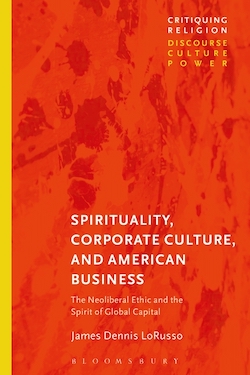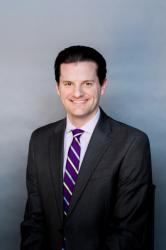We are in the midst of a surge of academic interest in the historical relationship between religion and business in America. Notable recent studies include those by Timothy Gloege, Darren Grem, Sarah Ruth Hammond, and Amanda Porterfield. To this growing body of literature James Dennis LoRusso has contributed Spirituality, Corporate Culture, and American Business. The book appears in Bloomsbury Academic’s series Critiquing Religion: Discourse, Culture, Power, a series that explicitly regards religion as “just another cultural tool used to gerrymander social space and distribute power relations in the modern world.”
 When such an assumption is adopted in a book about religion and business, readers can be fairly certain of what they will find: a declension story of business elites leveraging religion to further their global dominance. In his introduction LoRusso declares that such is his aim: “the language of spirituality serves a number of purposes, but predictably always reasserts the authority of business elites, managers, and capital” (13).
When such an assumption is adopted in a book about religion and business, readers can be fairly certain of what they will find: a declension story of business elites leveraging religion to further their global dominance. In his introduction LoRusso declares that such is his aim: “the language of spirituality serves a number of purposes, but predictably always reasserts the authority of business elites, managers, and capital” (13).
“Predictably” indeed.
LoRusso begins by tracing twentieth-century shifts in approaches to business, including the work of Peter Drucker, Douglas McGregor, Robert Greenleaf, Parker Palmer, and Judi Neal, who sought to moralize and spiritualize management and leadership in order to care for the whole person, not merely a business’s bottom line. These were forerunners and contributors to the faith and work and workplace spirituality movements. LoRusso is suspicious of these movements, to put it mildly. They are, he claims, fundamentally efforts at reinforcing neoliberal ideology and reasoning (67, 76). (“Masquerade” is one of his favorite terms in these contexts.) He then surveys the “entanglement” of spirituality with the tech industry, evidenced in the eclectic spirituality of Steve Jobs and the Zen of IBM’s Les Kaye. This is followed by analysis of the recent movement arising from the book Conscious Capitalism, coauthored by John Mackey, the cofounder of Whole Foods. This movement, LoRusso intuits, is “simultaneously a business reform movement as well as a neoliberal political project to advance the structural position of business” (99). The last two chapters illustrate similar phenomena through case studies the author conducted in New York and San Francisco.
What is perhaps most striking about LoRusso’s study is the unproven assumption that drives it: religion and business are each instruments of oppression that, when combined, create a doubly toxic elixir. The study suffers greatly from this jaundiced view of its subject, and often it seems more like an ideological exercise than a charitable examination of the sources. Though his conclusions about the unholy alliance of spirituality and business are predictable given his assumptions, LoRusso’s study still highlights important themes, figures, and events in the history of business and spirituality in America. Even readers who do not share his assumptions and conclusions can learn from his research into the efflorescence of religion in the workplace and the ready adoption of spirituality by American business leaders.
James Dennis LoRusso, Spirituality, Corporate Culture, and American Business: The Neoliberal Ethic and the Spirit of Global Capital (London: Bloomsbury Academic, 2017).

